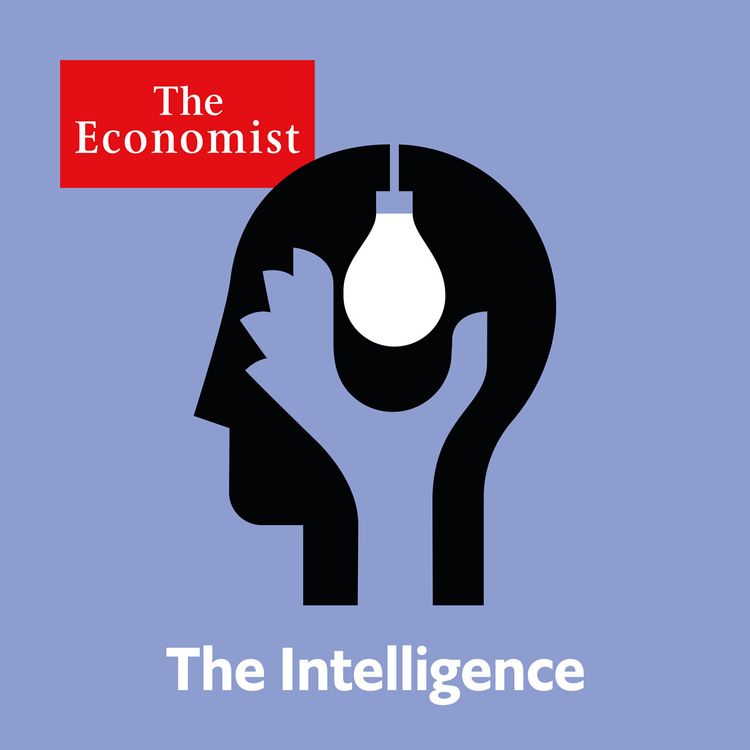Share

The Intelligence from The Economist
To a greater degree: widespread heatwaves
•
Vast stretches of the temperate world are baking or burning, and as climate change marches on widespread heatwaves will only grow more intense and more common. After a half-century of insurgency, some rebels of Colombia’s disbanded FARC group needed a new calling: they have become tour guides. And a look at where Ukraine can store its considerable grain harvest. For full access to print, digital and audio editions of The Economist, subscribe here www.economist.com/intelligenceoffer
More episodes
View all episodes

Trump’s fickle, Xi’s pickle: the dynamic driving US-China tensions
24:57|President Xi Jinping’s style of negotiating is staid, distanced, a quiet projection of power. President Donald Trump’s is not. That dynamic is complicating their gargantuan standoff. Spain ends up with more and more remains of migrants who die on their journeys—and its morgues cannot keep up (10:29). And in an age of video games pinball is not only surviving, it’s flipping thriving (18:11).Get a world of insights by subscribing to Economist Podcasts+. For more information about how to access Economist Podcasts+, please visit our FAQs page or watch our video explaining how to link your account.
Cash and checks: Argentina’s next IMF loan
21:40|For the 23rd time the International Monetary Fund will cough up, this time to the tune of $20bn. But the reforms stipulated by the loan, alongside promising changes already under way, suggest this time might be different. Near America’s border with Mexico, high-speed chases have become more common—and more deadly (9:08). And myriad uncertainties are making Europe a continent of preppers (15:08).Get a world of insights by subscribing to Economist Podcasts+. For more information about how to access Economist Podcasts+, please visit our FAQs page or watch our video explaining how to link your account.
The buck stops here? The threats to dollar primacy
23:57|Falling trust in the greenback is most apparent in bond-market moves. How close is the dollar to losing its status as the world’s go-to currency, and what could take its place? We take a look at Jordan Bardella, the young, polished, ever-rising star of France’s far right (11:56). And Hong Kong’s notoriously gruff cab drivers are told to smile more…or else (18:26).Get a world of insights by subscribing to Economist Podcasts+. For more information about how to access Economist Podcasts+, please visit our FAQs page or watch our video explaining how to link your account.
Bloody Sunday: Russia’s strikes on Sumy
22:37|President Donald Trump called the weekend strike on Sumy a “mistake”; other leaders called it a war crime. We examine the prospects for peace when Russia is brazenly hitting civilian targets. As scientists flee American institutions, Europe is trying to woo them (10:29). And Britain’s historical consumer-price index as a fascinating window into how shoppers’ tastes have shifted (17:24).Get a world of insights by subscribing to Economist Podcasts+. For more information about how to access Economist Podcasts+, please visit our FAQs page or watch our video explaining how to link your account.
The Weekend Intelligence: Can we make babies in space?
42:14|The Weekend Intelligence has been a little obsessed with babies of late. Or more specifically, the lack of them. This week we’re shifting the focus. From demography to biology, and beyond. In this episode we decided to take techno-accelerationist Elon Musk at his word and imagine a possible future where humans settle on Mars. There are many questions that arise when thinking about humans living off-planet but our Global Health Editor, Natasha Loder starts with a fundamental one. Can you make babies in space? Listen to what matters most, from global politics and business to science and technology—Subscribe to Economist Podcasts+For more information about how to access Economist Podcasts+, please visit our FAQs page or watch our video explaining how to link your account.Music by Blue dot Sessions and Epidemic.
The great brawl: China v America
26:45|Donald Trump is now aiming his trade war squarely at China. As the tit-for-tat tariff battle keeps escalating, investors are fleeing to safe assets. What will happen next? Germany’s Friedrich Merz finally signs a deal for a coalition government (10:12). And remembering Betty Webb, who worked at Britain’s wartime codebreaking centre Bletchley Park (19:36). Listen to what matters most, from global politics and business to science and technology—Subscribe to Economist Podcasts+For more information about how to access Economist Podcasts+, please visit our FAQs page or watch our video explaining how to link your account.
Art of the real: Trump bows to markets
21:27|Just 12 hours after Donald Trump launched his searing regime of tariffs, he paused many of them for 90 days. What's next for global trade? An outlandish proposal to build data centres in space (8:14). And why “The Great Gatsby” is just as relevant, 100 years on (15:58).Listen to what matters most, from global politics and business to science and technology—Subscribe to Economist Podcasts+For more information about how to access Economist Podcasts+, please visit our FAQs page or watch our video explaining how to link your account.
Pulp friction: the trade war bites Apple
23:04|As Donald Trump’s sweeping tariffs take effect, our correspondent explains how one of America’s most profitable companies may navigate the trade war. Are class divides in Britain softening (9:28)? And Republican influencers define what it is to be a conservative woman (16:08).Listen to what matters most, from global politics and business to science and technology—Subscribe to Economist Podcasts+For more information about how to access Economist Podcasts+, please visit our FAQs page or watch our video explaining how to link your account.
Economies of sail: migrant-smuggling entrepreneurs
25:11|More than 36,000 migrants crossed the English Channel in small boats last year. Our correspondent investigates the increasingly sophisticated business strategies of the criminals who smuggle them. As the planet heats, wildfires in East Asia are becoming fiercer and more frequent (10:36). And why ordinary Americans are falling out of love with their former international allies (18:31).Listen to what matters most, from global politics and business to science and technology—Subscribe to Economist Podcasts+For more information about how to access Economist Podcasts+, please visit our FAQs page or watch our video explaining how to link your account.